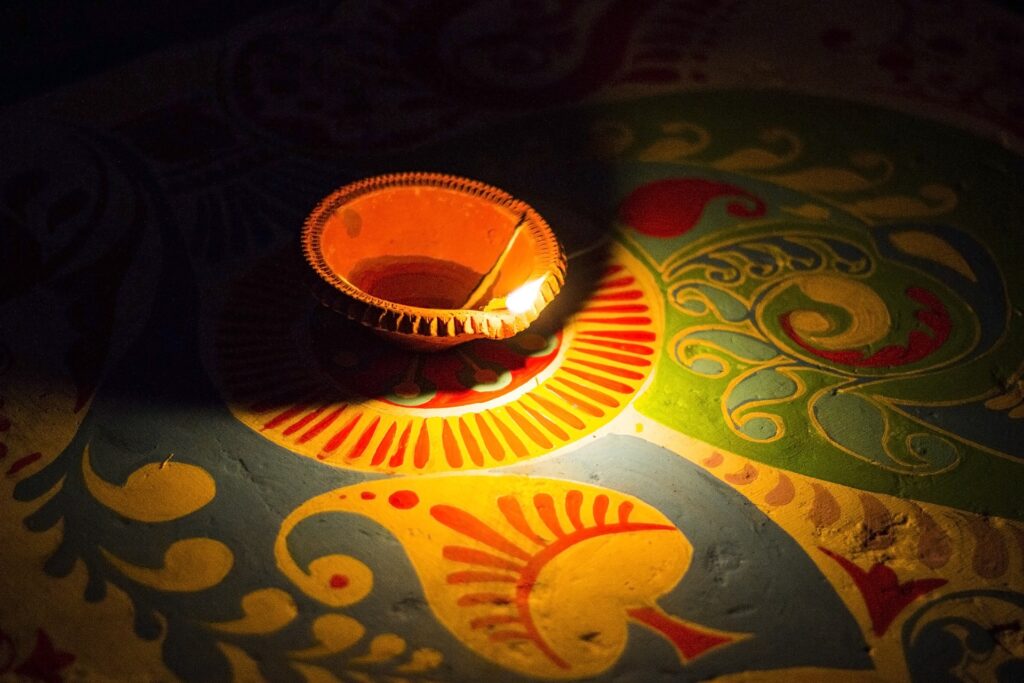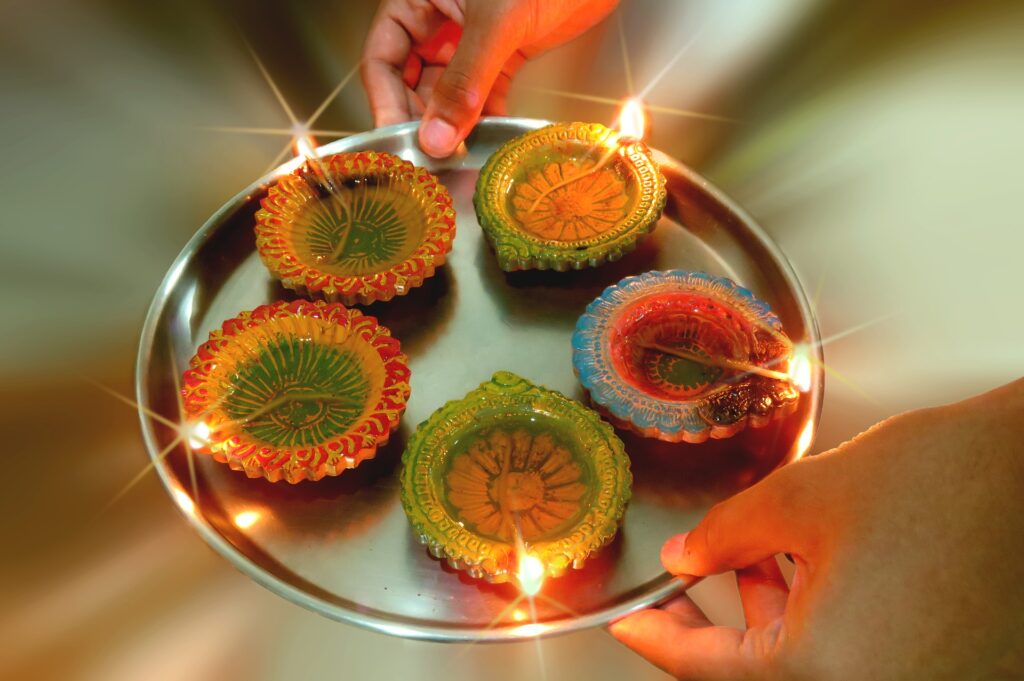In this essay we are going to talk about the Diwali. Diwali is a major religious festival observed mostly by Hindu but also by Sikhs, Jains and Buddhists to some extent. The name ‘Diwali’ is derived from the Sanskrit word ‘Deepavali’ or row of lights and also is commonly known as festival of lights. This festival is observed in the Kartikeya month of Hindu Lunisolar calendar or in mid-October.
Short Essay on Diwali
Various myths are associated with this festival like that of Ramayana, and slaying of Narakasur by lord Krishna. Though goddess Laxmi is worshipped all over India during this period but In Eastern India only the worship of demon slayer goddess Kali is the most important part of the festival that is why ‘Diwali’ is also known as Kali Puja in this part of the country.
History and Origin- The origin of Diwali lies in the harvest season and the festivities related to it in ancient India. In Skanda Purana Diya or the earthen lamps are considered as the symbol of sun or the cosmic sources of light that removes the darkness of sins. During king Harsha’s rule this festival was observed as a sacred day when earthen lamps are lit in the house and newlyweds couples receive gifts. Also some scriptures refer to this as a period when you are supposed to whitewash and clean your houses. Many Persian and Italian travelers described this as a festive period when people repaired their homes, lit earthen lamps, feast and danced.

Religious Significance
Hinduism- In north India Diwali is considered as the day when lord Ram with his brother Laxman and wife Devi Sita returned to Ajodhya after 14 years of exile and the people of the city lit their houses with lamp to express their joy. Another myth is that in Dvapara age lord Krishna an avatar of the Hindu god Vishnu had slain a demon named Narakasur and this day is considered as an auspicious period of triumph of good over evil. Also many Hindus associated this festival with the worship of goddess Laxmi deity of prosperity and wealth.
Click Here: Interesting Articles To Read When Bored
The myth is that this on this day goddess Laxmi was born from Samudra Manthan( the churning of elixir from a cosmic ocean). According to another Vedic legend on this day goddess Laxmi got married to lord Vishnu. In Eastern part of India though this festival is mainly associated with the worship of demon slaying goddess Kali. The trade and merchant families sometimes pay offering to goddess Saraswati, patron goddess of knowledge, fine arts and music and demi god Kuber who symbolizes treasury, book keeping and wealth management. In western part of India, in the state of Gujrat this festival considered as the beginning of new year. But the all over theme of the festival remains same that is the triumph of evil over good and overcoming the darkness of ignorance.
Read Also: Short Essay On Festivals
Jainism- In Jainism Diwali is considered as ‘Mahavira Nirvana Divas’ or the earthly death and Nirvana of Mahavira. According to legends after death of Mahavira 18 kings came together for his finale teachings and they announced to light lamps in the remembrance of the great light of wisdom Mahavira himself. This event mostly focuses on one’s dedication to Mahavira’s teachings.
Sikhism- Sikhs celebrate this day as ‘Bandi Chor’ diwas or the liberation from Sikh Guru Har Gobind from Gwaliyar fort by Mughal emperor Jahangir. This day is mostly celebrated as a way to strengthen community bonding.
Buddhism- They newer Buddhists or the followers of Vajrayana Buddhism mostly observe this day by offering prayers to goddess Laxmi.
Read Also: Short Essay On Raksha Bandhan
Festivities of Diwali
Making Rangoli- Making rangoli is an inseparable part of Diwali festivities. Rangoli is mostly a flower pattern made with colors, flower petals and sometimes with rice.
Dhanteras- Dhanteras is a very part of five days Diwali celebration and is mostly associated with the worship of goddess Laxmi. In this period people buy expensive ornaments, coins, utensils, gold and silver bars etc. in hope to keep prosperity all around the year. People lit candles and earthen lamps, clean their houses, decorate them with rangolis, wear new clothes and evening they worship goddess Laxmi and made her offerings like harvested paddy, rice cakes, Batasha( one type of hollow sugar cakes), Halwa, Khichdi, Puri etc. This day is also considered to be the birthday of Ayurvedic icon Dhanwantari who is worshipped as the god of medicine and good health, also Havan are offered to him in this occasion.
Naraka Chaturdashi/ Choti Diwali- This day is celebrated as a day to free the souls trapped in hell. On this day people lit candles on their roof to guide the spirits of their ancestors to come and bless them. It is also celebrated as ‘Rup Chaudas’ in some parts of North India where women take a bath in the morning holding an Diya or earthen lamp in their hands. Some traditional beauty packs like a mixture of gram flours and chick peas are applied to women’s face. They believe that observing this ritual will enhance their beauty. It is also the day to buy and make sweets. Delicious sweet delicacies are prepared with flour, rice, chick peas, dry fruits, semolina, milk solids( also known as Mawa or Khowa), butter and ghee.
Read Also: Short Essay On Dussehra
All these savory and sweet delights like kachori, Gulab jamun, halwa, laddu, shrikhand, Sandesh etc. are a treat to the mouth. All this delicacies wrapped in silver foil, decorated with rose petals are also a pleasing treat to the eyes. These are also sent to friends and relatives as gifts. On this day Hanuman puja is observed in Gujarat. It is believed that on this day evil spirits roam around human realm and worshiping lord Hanuman will ward off the spirits. Same kind of event is also observed in Bengal under the name Bhoot Chaturdashi. Some also lit Diya in the south most corner of their house to please Yam or the deity of death. On this day Diwali is mostly celebrated in South India and Maharashtra.
Lakshmi Puja and Kali Puja- The third day or the day that coincides with the new moon of the month is deemed appropriate to worship both goddess Laxmi and Kali. On this day shopkeepers usually performs a small Puja on their shop or office premises. On the evening people generally prepare feasts, wear new clothes, take blessings from the elders. Children also burn fire crackers on this day. In the Bengali Hindu community though Devi Kali a war goddess is worshiped instead of goddess Laxmi. The unique phenomena of Kali Puja of Bengal is that on this day goddess is worshipped in places like crematoriums.
Annakut or Govardhan Puja- The day after Diwali is called Annakut, Bali Bhadra, Govardhan puja and many other names varying across the regions. This event is associated with Lord Vishnu’s victory over demon Bali. Another myth is related with Lord Shiva and goddess Parvati playing a dice game and Parvati winning or which is further interpreted as the victory of the feminine over destructive masculine power. This day is celebrated to strengthen the bond between husband and wife.
On this day in some Hindu communities husbands give gifts to their wives or in some places newly married couples are invited to a feast and given gifts. In some rural and farming communities Govardhan Puja is celebrated. The myth associated with that is how Lord Krishna saved cowherds from rain and floods by lifting mount Govardhan on his head. One hundred meals from different crops are prepared and are offered to lord Krishna, for which this is also known as Annakut. This day is celebrated the first day of new year in Gujarat and on this day people buy good things like salt and offer prayers to lord Krishna.

Bhai Duj- On the last day of Diwali festivities Bhai Duj is observed. On this day sisters observe some rituals and feed their brothers for their long life. Though the type of rituals do vary from place to place and brothers give their sisters gifts. It is observed as a festival to strengthen brother sister bond. The legend says that this event originates from Yam returning to his sister Yamuna and for that it is the brothers who come to their sisters’ homes. The Sikh people observe Vishwakarma Puja on this day who is believed to be the prime deity of manufacturing, hand loom, machines, textiles and craft trades.
Other Traditions- Diwali plays a very significant role in Indian economy, as people tend to buy expensive goods in this time. Also other industries like confectionary and fireworks too flourish in this time.
Click Here: Interesting Articles To Read When Bored
Environmental Issue- The fireworks that are burnt in this time are very harmful to the environment and degrade air qualities massively. This can cause huge raspatory problems to both children and elderly people and can also cause allergies and cold.
Diwali is considered as one of the biggest festivals of India. People return to their homes to celebrate this occasion with their families and they eagerly wait for this. Indians living outside India also celebrate this festival with grandeur.